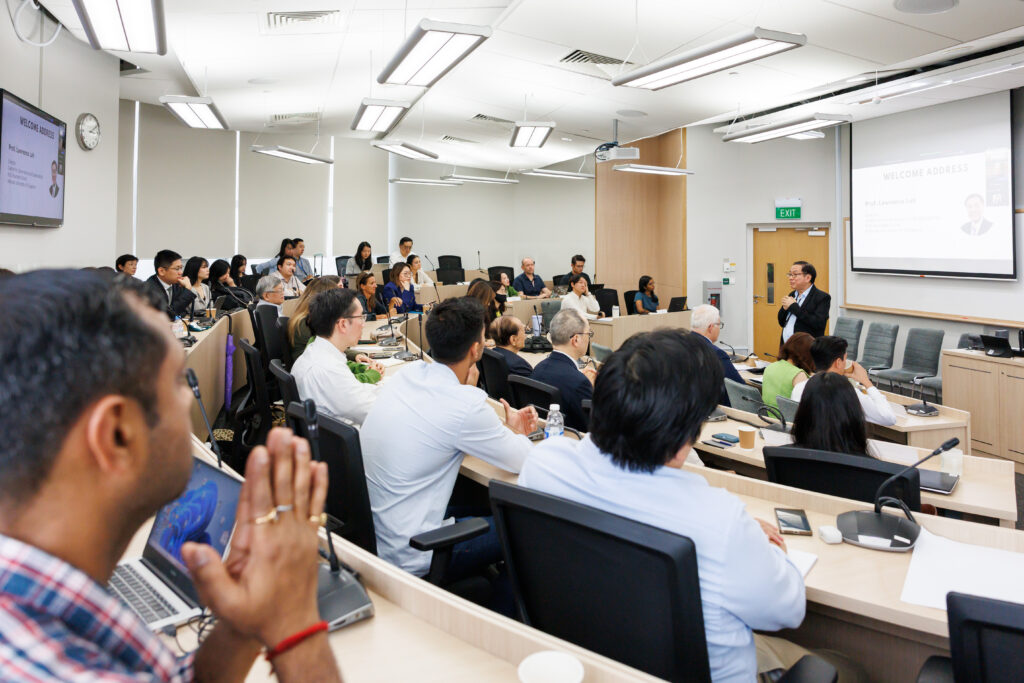New Report: Nature-related Strategies and Practices in Asia Pacific

Prof Lawrence Loh (left), Director, CGS, presenting the report “Nature-related Strategies and Practices in Asia Pacific” to Mr Thierry Marty, President, North and South-East Asia Pacific, Kering.
A new study by the NUS Centre for Governance and Sustainability (CGS) and global luxury group Kering has shown gaps in nature-related disclosures among Asia-Pacific companies.
Unveiled on 14 January 2025 at the workshop “Business Action for Nature”, the report “Nature-related Strategies and Practices in Asia Pacific” analysed the sustainability or annual reports of 700 listed companies across 14 Asia Pacific jurisdictions.
While 72% of 700 listed companies identified topics such as water, biodiversity and ecosystem protection in their sustainability or annual reports, only 25% considered nature-related issues material to their businesses.
Among the companies that made nature-related disclosures, Australia took the lead with 68% considering nature as material. This is followed by New Zealand (48%) and Singapore and Malaysia (both at 42%).
Only 13% disclosed their alignment with the Taskforce on Nature-related Financial Disclosures (TNFD) framework.
Ms Marie-Claire Daveu, Chief Sustainability and Institutional Affairs Officer, Kering, said in the joint release, “Voluntary actions won’t be enough to halt and reverse nature loss by 2030: like the work initiated for climate change, it is now imperative that nature-related issues are embedded into companies’ strategies for the long run; it is imperative for nature policies to be ambitious and progressive enough. Through this partnership we are conducting with CGS, NUS Business School, Kering contributes to delivering tangible facts and figures to help Asia-Pacific businesses build robust nature policies. With climate, biodiversity and fashion interlinked, companies need to move towards a nature-positive economy – and fast.”
Prof Lawrence Loh, Director, CGS, said, “While there is growing recognition of nature-related issues in corporate sustainability strategies across Asia-Pacific, nature remains a nascent issue compared to climate. However, as climate reporting matures, integrating nature-related considerations into these frameworks is crucial for a comprehensive understanding of environmental risks. By aligning with global nature-reporting frameworks, companies can enhance their risk management, drive meaningful change, and contribute to a more sustainable future in an increasingly interconnected environmental landscape.”
Workshop attracted an audience of over 80
The report findings were presented to an audience of over 80 at the “Business Action for Nature” hybrid workshop held at NUS Business School. Presented by CGS Director Prof Lawrence Loh and research analyst Ms Joycelyn Lee, the findings reveal areas where companies can do better.


For businesses that want to start on biodiversity, what is important is to start a journey to have quantitative objectives, a clear vision, and make tangible progress every year, said Ms Marie-Claire Daveu, Chief Sustainability and Institutional Affairs Officer, Kering, in her virtual opening address.
Another insightful segment is a presentation on nature finance by the founding partners of Good Growth, Mr Nick Keppel-Palmer and Mr Mandar Jayawant. They explained why we should look at the regenerative values of natural landscapes and the importance of landscape stewardship.

In a panel discussion moderated by Prof Loh, our panellists Ms Esther An, Chief Sustainability Officer, City Developments Limited, Mr Eric Lim, Chief Sustainability Officer, UOB, and Mr Raye Padit, Founder and CEO, The Fashion Pulpit, discussed various topics such as how macroeconomic developments might shape companies’ sustainability movements, biodiversity credits, sustainability standards and the immediacy of targets.

In closing, Mr Thierry Marty, President, North and South-East Asia Pacific, Kering, said, “Together with NUS, we remain committed to advancing sustainability initiatives, fostering cross-industry collaboration and inspiring future leaders to drive impactful change.”


